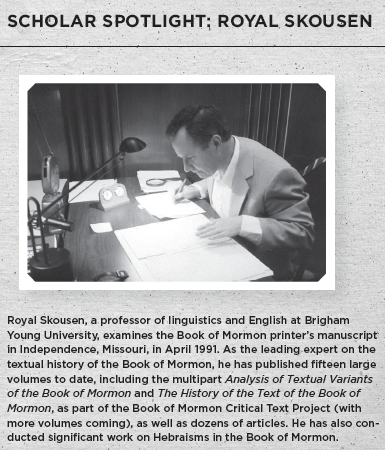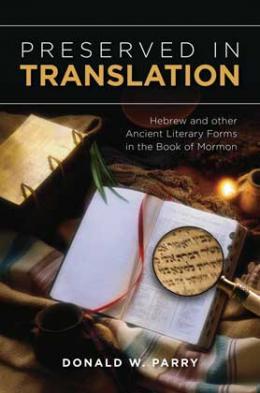Delayed Subjects
Donald W. Perry, “Delayed Subjects,” in Preserved in Translation: Hebrew and Other Ancient Literary Forms in the Book of Mormon (Provo, UT: Religious Studies Center, Brigham Young University; Salt Lake City: Deseret Book), 119‒22.
"the morning cometh, and also the night" (Isaiah 21:12)
At times, conventional English has two or more grammatical subjects that share a single verb. For example, we might say, “The wife and the husband (two subjects) walked (singular verb) through the park.” Biblical Hebrew does the same.[1] However, in English translation the Bible occasionally gives a more literal rendering that splits the two subjects in a way that reads awkwardly:
“The houses of the Egyptians shall be full of swarms of flies, and also the ground” (Exodus 8:21). English would generally place houses and ground together: “The houses of the Egyptians and also the ground shall be full of swarms of flies.”
“Then David took hold on his clothes, and rent them; and likewise all the men that were with him” (2 Samuel 1:11). In English we would expect this sentence to read: “Then David and all the men that were with him took hold on their clothes, and rent them.”
“So David went up thither, and his two wives also” (2 Samuel 2:2). English would generally place the two subjects together: “So David and his two wives went up thither.”
Here are a few additional examples of this structure in the Old Testament:
“lest the king be swallowed up, and all the people that are with him” (2 Samuel 17:16)
“the king went forth, and all the people after him” (2 Samuel 15:17)
“all the people of Judah conducted the king, and also half the people of Israel” (2 Samuel 19:40)
“the morning cometh, and also the night” (Isaiah 21:12)

This grammatical structure is a Hebraism, or at least a Hebrew-like construction, and is “for the most part, unacceptable in modern English.”[2] As might be expected, delayed conjoined subjects are also found in the Book of Mormon. Royal Skousen has identified dozens of them,[3] including the following:
“Laman was angry with me and also my father and also was Lemuel” (1 Nephi 3:28). In typical English we would expect the two subjects to be together: “Laman and Lemuel were angry with me and my father.”
“When Laman saw me he was exceedingly frightened and also Lemuel and Sam” (1 Nephi 4:28). A typical English construction would combine the subjects: “When Laman, Lemuel, and Sam saw me, they were exceedingly frightened.”
Here’s a sampling of additional delayed conjoined subjects in the Book of Mormon:
“after thy seed shall be destroyed, and dwindle in unbelief, and also the seed of thy brethren” (1 Nephi 13:35)
“many of their proceedings are written upon the larger plates, and their wars, and their contentions, and the reigns of their kings” (Jacob 3:13)
“the very trees obey us, or the mountains, or the waves of the sea” (Jacob 4:6)
“and they were scattered upon much of the face of the land, and the Lamanites also” (Jarom 1:6)
“and therefore he became a wine-bibber, and also his people” (Mosiah 11:15)
“now all the people of Nephi was assembled together, and also all the people of Zarahemla” (Mosiah 25:4)
Finding multiple instances of this grammatical form in the Book of Mormon is significant because in echoing similar constructions in the Hebrew Bible, these delayed subjects begin to look less like an ancient record keeper’s afterthought or the modern translator’s unconventional English and more like another evidence of the book’s authentic Hebrew language inheritance. It seems likely that new research will yield additional instances of this literary form in both the Hebrew Bible and the Book of Mormon.
Notes
[1] See Williams, Hebrew Syntax, 92–94; and Gesenius, Hebrew Grammar, 468.
[2] Skousen, History of the Text of the Book of Mormon: Part 1, 361.
[3] See Skousen, History of the Text of the Book of Mormon: Part 1, 386–97.
